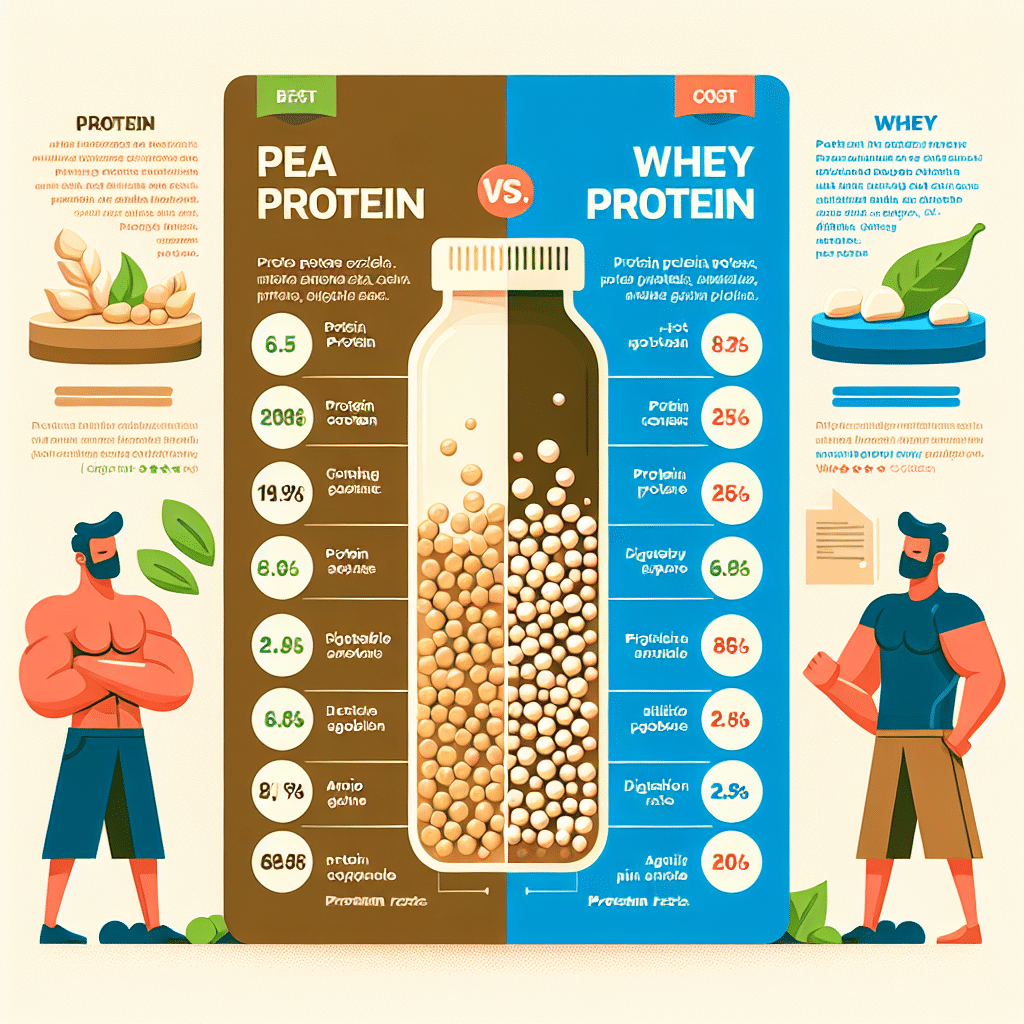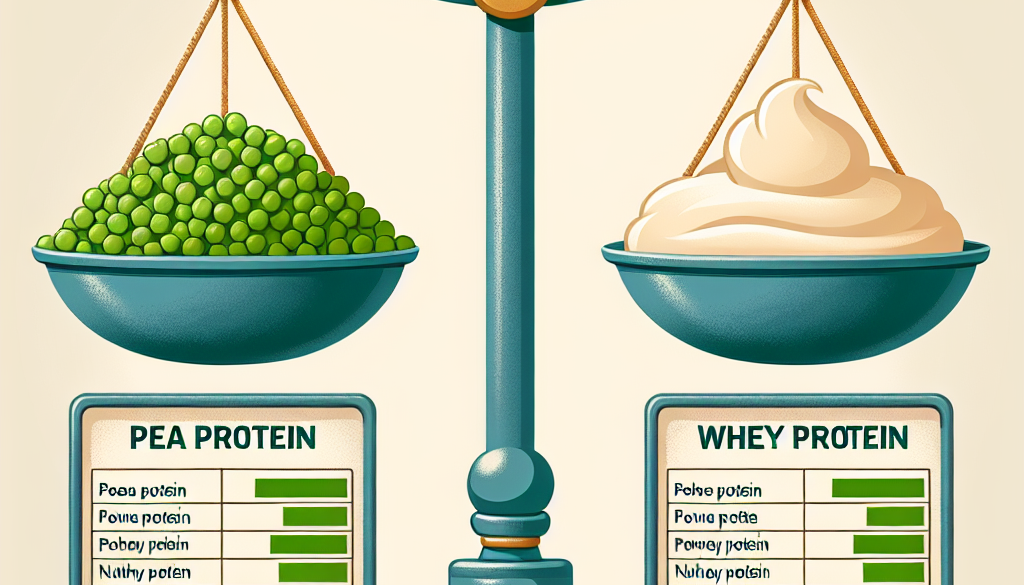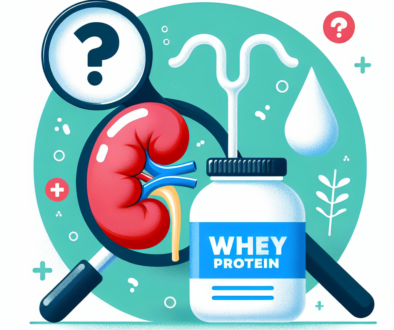Why Is Pea Protein Not As Good As Whey? The answer
Table of Contents
- Pea Protein vs. Whey: Understanding the Differences
- Complete vs. Incomplete Protein Sources
- Digestibility and Absorption
- Nutritional Content and Health Benefits
- Impact on Muscle Growth and Performance
- Taste and Mixability
- Environmental and Ethical Considerations
- Conclusion: Weighing Your Protein Options
- Discover ETprotein’s Premium Protein Products
Pea Protein vs. Whey: Understanding the Differences

Protein supplements are a staple in the diets of athletes, bodybuilders, and health-conscious individuals. Among the plethora of protein sources available, whey protein has long been the gold standard. However, with the rise of plant-based diets, pea protein has emerged as a popular alternative. Despite its growing popularity, there are several reasons why pea protein may not be as beneficial as whey protein for certain individuals and goals. In this article, we will explore the differences between pea protein and whey protein, and why whey might be the superior choice for some.
Complete vs. Incomplete Protein Sources
One of the primary differences between whey and pea protein is their amino acid profiles. Whey protein is a complete protein, meaning it contains all nine essential amino acids that the body cannot produce on its own. These amino acids are crucial for muscle repair, growth, and various metabolic processes.
- Leucine: Whey protein is particularly high in leucine, an essential amino acid that plays a key role in muscle protein synthesis.
- BCAAs: Whey contains a high concentration of branched-chain amino acids (BCAAs), which are vital for muscle recovery and growth.
Pea protein, on the other hand, is not a complete protein. While it contains all nine essential amino acids, it is lower in methionine and cysteine. To compensate for this, individuals often need to combine pea protein with other plant-based proteins to achieve a complete amino acid profile.
Digestibility and Absorption
The body’s ability to digest and absorb protein is critical for its utilization. Whey protein is known for its high digestibility and rapid absorption rate, which is beneficial for post-workout recovery when the body needs quick access to amino acids to begin the repair process.
- Whey Isolate: This form of whey protein is particularly fast-absorbing, making it a favorite among athletes.
- Hydrolyzed Whey: Hydrolyzed whey protein is pre-digested, allowing for even faster absorption.
Pea protein is generally considered to be less digestible than whey protein. Although advancements in processing have improved its digestibility, it still may not match the rapid absorption rate of whey, potentially leading to slower recovery times.
Nutritional Content and Health Benefits
Whey protein is not only about muscle building; it also offers a range of health benefits due to its rich nutritional content.
- Immunoglobulins: Whey contains immunoglobulins that support the immune system.
- Lactoferrin: This component has antibacterial and anti-inflammatory properties.
- Alpha-lactalbumin: Rich in tryptophan, alpha-lactalbumin can improve sleep and mood.
While pea protein does provide some health benefits, such as being hypoallergenic and easier on the digestive system for those with lactose intolerance, it lacks the additional bioactive compounds found in whey that contribute to overall health and well-being.
Impact on Muscle Growth and Performance
For those focused on muscle growth and athletic performance, whey protein’s superior amino acid profile and fast absorption rate make it a more effective choice. Numerous studies have shown that whey protein supplementation can lead to greater gains in muscle mass and strength compared to other protein sources.
- Post-Workout Recovery: Whey’s rapid absorption helps to quickly kickstart the muscle repair process.
- Muscle Protein Synthesis: The high leucine content in whey protein is more effective at stimulating muscle protein synthesis than other proteins.
While pea protein can support muscle growth to some extent, it may not be as efficient as whey protein in promoting maximal muscle protein synthesis and recovery.
Taste and Mixability
Practical considerations such as taste and mixability also play a role in protein supplement selection. Whey protein is often preferred for its smoother texture and more neutral flavor, which blends well with other ingredients in shakes and recipes.
Pea protein, while it has improved over the years, can still have a grittier texture and a more distinct taste that may not be as palatable or versatile as whey protein.
Environmental and Ethical Considerations
It’s important to note that while whey protein may have several advantages over pea protein in terms of nutrition and muscle-building potential, pea protein is often favored for its lower environmental impact and suitability for vegan diets.
- Sustainability: Pea protein production typically requires less water and land than dairy-based whey protein.
- Ethical Choices: For those following a vegan lifestyle, pea protein offers a plant-based protein alternative that aligns with their ethical choices.
Conclusion: Weighing Your Protein Options
In conclusion, while pea protein is a viable protein source for many, especially those following plant-based diets or with dairy sensitivities, whey protein stands out for its complete amino acid profile, superior digestibility, and additional health benefits. For individuals aiming to maximize muscle growth, recovery, and performance, whey protein may be the more effective choice.
However, it’s essential to consider personal dietary restrictions, ethical beliefs, and environmental impact when choosing a protein supplement. Both whey and pea proteins have their place in a balanced diet, and the best choice ultimately depends on individual goals and values.
Discover ETprotein’s Premium Protein Products
If you’re looking for high-quality protein supplements, ETprotein offers a diverse range of products to meet your needs. Whether you prefer plant-based options like pea protein or the muscle-building power of whey, ETprotein has you covered with their organic, non-GMO, and allergen-free proteins. With a commitment to purity and taste, ETprotein is the go-to source for all your protein requirements.
About ETprotein:
ETprotein, a reputable protein and L-(+)-Ergothioneine (EGT) Chinese factory manufacturer and supplier, is renowned for producing, stocking, exporting, and delivering the highest quality organic bulk vegan proteins and L-(+)-Ergothioneine. They include Organic rice protein, clear rice protein, pea protein, clear pea protein, watermelon seed protein, pumpkin seed protein, sunflower seed protein, mung bean protein, peanut protein, and L-(+)-Ergothioneine EGT Pharmaceutical grade, L-(+)-Ergothioneine EGT food grade, L-(+)-Ergothioneine EGT cosmetic grade, L-(+)-Ergothioneine EGT reference grade and L-(+)-Ergothioneine EGT standard. Their offerings, characterized by a neutral taste, non-GMO, allergen-free attributes, with L-(+)-Ergothioneine purity over 98%, 99%, cater to a diverse range of industries. They serve nutraceutical, pharmaceutical, cosmeceutical, veterinary, as well as food and beverage finished product distributors, traders, and manufacturers across Europe, USA, Canada, Australia, Thailand, Japan, Korea, Brazil, and Chile, among others.
ETprotein specialization includes exporting and delivering tailor-made protein powder and finished nutritional supplements. Their extensive product range covers sectors like Food and Beverage, Sports Nutrition, Weight Management, Dietary Supplements, Health and Wellness Products, and Infant Formula, ensuring comprehensive solutions to meet all your protein needs.
As a trusted company by leading global food and beverage brands and Fortune 500 companies, ETprotein reinforces China’s reputation in the global arena. For more information or to sample their products, please contact them and email sales(at)ETprotein.com today.














